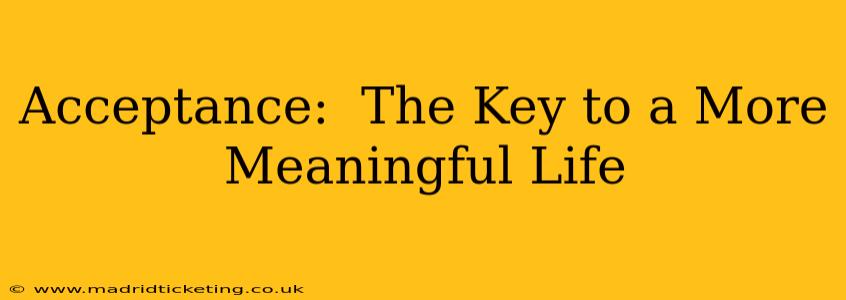Acceptance. It's a word that often evokes images of passive resignation, of simply giving up. But true acceptance, as practiced by individuals on a path toward a more meaningful life, is far from that. It's a powerful, active choice that unlocks inner peace, fosters resilience, and allows us to live more fully in the present moment. This isn't about ignoring problems or pretending everything is perfect; it's about embracing reality, even the difficult parts, and finding peace within ourselves.
What Does Acceptance Really Mean?
Acceptance, in the context of a meaningful life, isn't about condoning undesirable situations. It's not about passively accepting abuse or harmful circumstances. Instead, it's about acknowledging the reality of a situation – as it is – without judgment or resistance. This involves recognizing our emotions, thoughts, and experiences without trying to change or control them. It's about acknowledging the present moment, understanding its impermanence, and finding a way to navigate it with grace and resilience.
How Does Acceptance Lead to a More Meaningful Life?
The benefits of cultivating acceptance are numerous and profound. By accepting what is, we free ourselves from the constant struggle against reality. This creates space for:
- Reduced Stress and Anxiety: Constantly fighting against what we can't control is exhausting. Acceptance allows us to let go of this fruitless struggle, freeing up mental and emotional energy.
- Increased Self-Compassion: Acceptance requires us to be kind to ourselves, even when we make mistakes or face challenges. This self-compassion is crucial for building resilience and fostering a positive self-image.
- Enhanced Relationships: Acceptance extends to our relationships with others. By accepting people for who they are, flaws and all, we foster deeper, more authentic connections.
- Greater Clarity and Focus: When we're not constantly battling against reality, we gain clarity and focus, allowing us to pursue our goals with greater intention.
- A Deeper Appreciation for Life: Acceptance allows us to appreciate the beauty and wonder of life, even amidst difficulties. We become more present and mindful, savoring the simple moments.
How Can I Practice Acceptance?
Developing acceptance is a journey, not a destination. It takes time, patience, and consistent effort. Here are some practical steps:
- Mindfulness Meditation: Regular meditation helps us cultivate awareness of our thoughts and emotions without judgment. This increased self-awareness is the foundation of acceptance.
- Journaling: Writing about our thoughts and feelings can help us process them and gain a new perspective.
- Cognitive Behavioral Therapy (CBT): CBT techniques can help us challenge negative thought patterns and develop healthier coping mechanisms.
- Seeking Support: Talking to a therapist or counselor can provide valuable guidance and support.
What if Acceptance Feels Like Giving Up?
This is a common misconception. Acceptance isn't about giving up on your goals or dreams. It's about accepting the current reality while actively working towards your desired future. For example, if you're struggling with a health challenge, acceptance might involve acknowledging the difficulty of the situation while simultaneously pursuing treatment and making healthy lifestyle choices. It's about finding peace in the present moment while striving for a better future.
Isn't Acceptance Just Passivity?
No, acceptance is not passivity. It's about acknowledging what is, without resistance. This doesn't mean inaction; it often fuels proactive and positive change. For instance, accepting that you have a fear of public speaking doesn't mean you won't try to overcome it. Instead, it means approaching the challenge with self-compassion and realistic expectations.
How Can I Accept Difficult Emotions?
Difficult emotions are a part of the human experience. Acceptance of these emotions doesn't mean you have to like them; it means acknowledging their presence without judgment or resistance. Allow yourself to feel them fully, without trying to suppress or avoid them. Recognize that emotions are transient; they come and go.
Conclusion: Embracing the Power of Acceptance
Acceptance is a transformative practice that can profoundly impact our lives. By embracing reality, even the challenging aspects, we open ourselves to a more meaningful and fulfilling existence. It's a journey of self-discovery, resilience, and inner peace – a journey worth taking. The path to a more meaningful life often begins with the simple, yet profound, act of acceptance.

